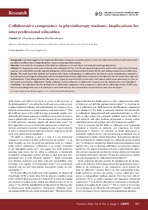Collaborative competency in physiotherapy students: Implications for interprofessional education
Abstract
BACKGROUND. It has been suggested that improved collaborative competency in multidisciplinary teams may help understand how health professionals
can address problems that no single-disciplinary expert can manage independently.
OBJECTIVE. To describe the development of the ability to collaborate in a South African university physiotherapy department.
METHODS. Focus group discussions and interviews were conducted with 3rd- and 4th-year physiotherapy students and lecturers, respectively. Participant
responses were analysed thematically and evaluated against a self-developed framework that described the key and enabling competencies in collaboration.
RESULTS. The study found that students and lecturers had a basic understanding of collaboration, but lacked a more comprehensive perspective.
Students and lecturers suggested that group work had the potential to develop collaborative competency, but expressed concerns about task design and
implementation. While interprofessional education was a required component of the curriculum, both students and lecturers questioned the value of
the module as it related to collaboration. Finally, challenges to the development of collaborative competency in the clinical context were highlighted.
CONCLUSION. The study found that the development of collaborative competency, while recognised as important for addressing complex health needs,
had several challenges that need to be addressed in order to be effective. Recommendations are provided for curriculum developers.

